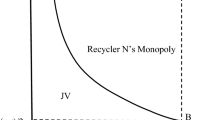Abstract
In this paper, we model international recycling in a two-country model, where firms in a Northern, developed country produce goods (such as electronic equipment) and recycle them, compared to firms in a Southern, developing country, which recycle “post-consumer” products (e-waste) imported from the Northern country. We investigate optimal tax-subsidy scenarios for the following three cases: (1) an on-site disposal economy where international recycling is freely implemented, (2) a return economy where Southern firms’ waste is recycled and returned to the North, and (3) an inactive Southern economy where no policy instruments takes place because of administrative shortages. For each of the above three cases, alternative tax-subsidy systems can maximize the social welfare of both countries, which is called a deposit-refund system.
Similar content being viewed by others
Notes
As stated in above, global reuse has been analyzed in previous studies. Although reuse is crucial for resource conversation and for saving final disposal waste, these results will depend upon the utility of second-hand goods. We prioritize clarity as a model in our study.
Subscripts denote (partial) derivatives with respect to the relevant variable.
One may be interested in that firms and consumers organize lobby groups respectively and influence the tax-subsidy rates politically determined. However, unlike the previous study in this line (e.g., Fredriksson 1997), there are many variables about the firms, consumers, and governments in our model. Unfortunately, we cannot analytically solve such expansion.
For the space limitation, we omit FOCs for each maximization problems throughout the paper. They are available upon request.
If the sign of the above term is negative, more recycling would generate an additional benefit that exceeds social cost. This cannot occur in an optimum condition.
Actually developed countries pay attention to the environment of developing countries, regulating the export of e-waste and others on the basis of the Basel Convention and its corresponding domestic law.
References
Baldé, C.P., Wang, F., Kuehr, R., Huisman, J.: The Global E-Waste Monitor–2014, United Nations University, IAS–SCYCLE, Bonn, Germany (2015)
Cassing, J., Kuhn, T.: Strategic environmental policies when waste products are tradable. Rev. Int. Econ. 11, 495–511 (2003)
Chi, X., Wang, M.Y., Reuter, M.A.: E-waste collection channels and household recycling behaviors in Taizhou of China. J. Clean. Prod. 80, 87–95 (2014)
Copeland, B.R.: International trade in waste products in the presence of illegal disposal. J. Environ. Econ. Manag. 20, 143–162 (1991)
Fredriksson, P.G.: The political economy of pollution taxes in a small open economy. J. Environ. Econ. Manag. 33(1), 44–58 (1997)
Fullerton, D., Kinnaman, T.: Garbage, recycling and illicit burning or dumping. J. Environ. Econ. Manag. 29, 78–91 (1995)
Higashida, K., Jinji, N.: Strategic use of recycled content standards under international duopoly. J. Environ. Econ. Manag. 51, 242–257 (2006)
Ino, H.: Optimal environmental policy for waste disposal and recycling when firms are not compliant. J. Environ. Econ. Manag. 62, 290–308 (2011)
Kinnaman, T., Yokoo, H.: The environmental consequences of global reuse. Am. Econ. Rev. 101, 71–76 (2011)
Palmer, K., Walls, M.: Optimal policies for solid waste disposal taxes, subsidies, and standards. J. Public Econ. 65, 193–205 (1997)
Shinkuma, T.: On the second-best policy of household’s waste recycling. Environ. Resour. Econ. 24, 77–95 (2003)
Shinkuma, T., Managi, S.: Waste and Recycling. Routledge, New York (2011)
Sthiannopkao, S., Wong, M.H.: Handling e-waste in developed and developing countries: initiatives, practices, and consequences. Sci. Total Environ. 463, 1147–1153 (2013)
Walls, M., Palmer, K.: Upstream pollution, downstream waste disposal, and the design of comprehensive environmental policies. J. Environ. Econ. Manag. 36, 94–108 (2001)
Yokoo, H., Kinnaman, T.C.: Global reuse and optimal waste policy. Environ. Dev. Econ. 18, 595–614 (2013)
Author information
Authors and Affiliations
Corresponding author
Additional information
Publisher’s Note
Springer Nature remains neutral with regard to jurisdictional claims in published maps and institutional affiliations.
This research is financially supported by JSPS KAKENHI Grant No. 16K03662. The author thanks Professor Kyoko Hirose, Hideo Koide, and Masakazu Maezuru for their helpful comments.
Electronic supplementary material
Below is the link to the electronic supplementary material.
Rights and permissions
About this article
Cite this article
Honma, S. Optimal policies for international recycling between developed and developing countries. Lett Spat Resour Sci 12, 143–153 (2019). https://doi.org/10.1007/s12076-019-00233-1
Received:
Accepted:
Published:
Issue Date:
DOI: https://doi.org/10.1007/s12076-019-00233-1




